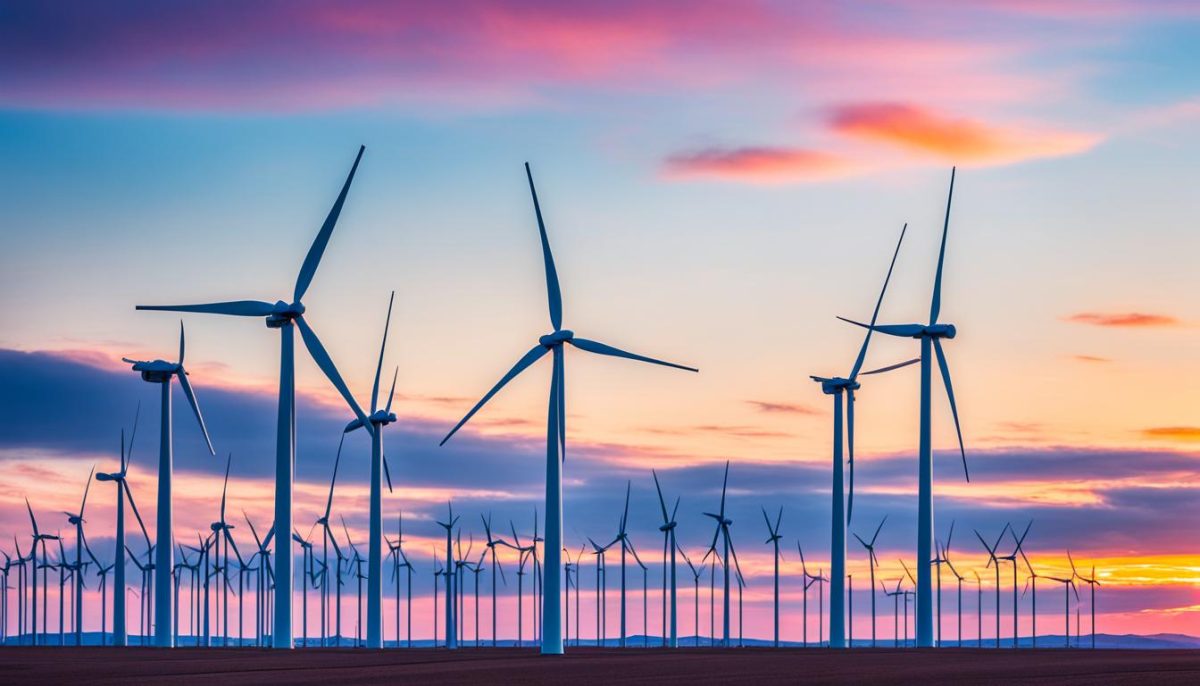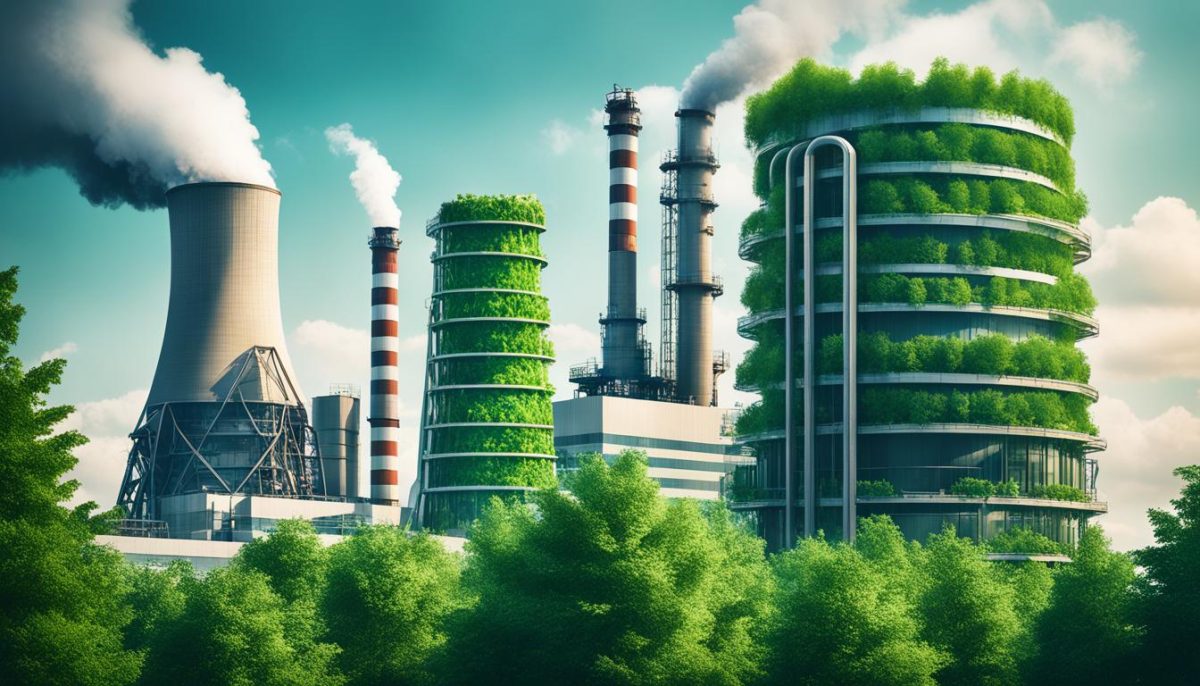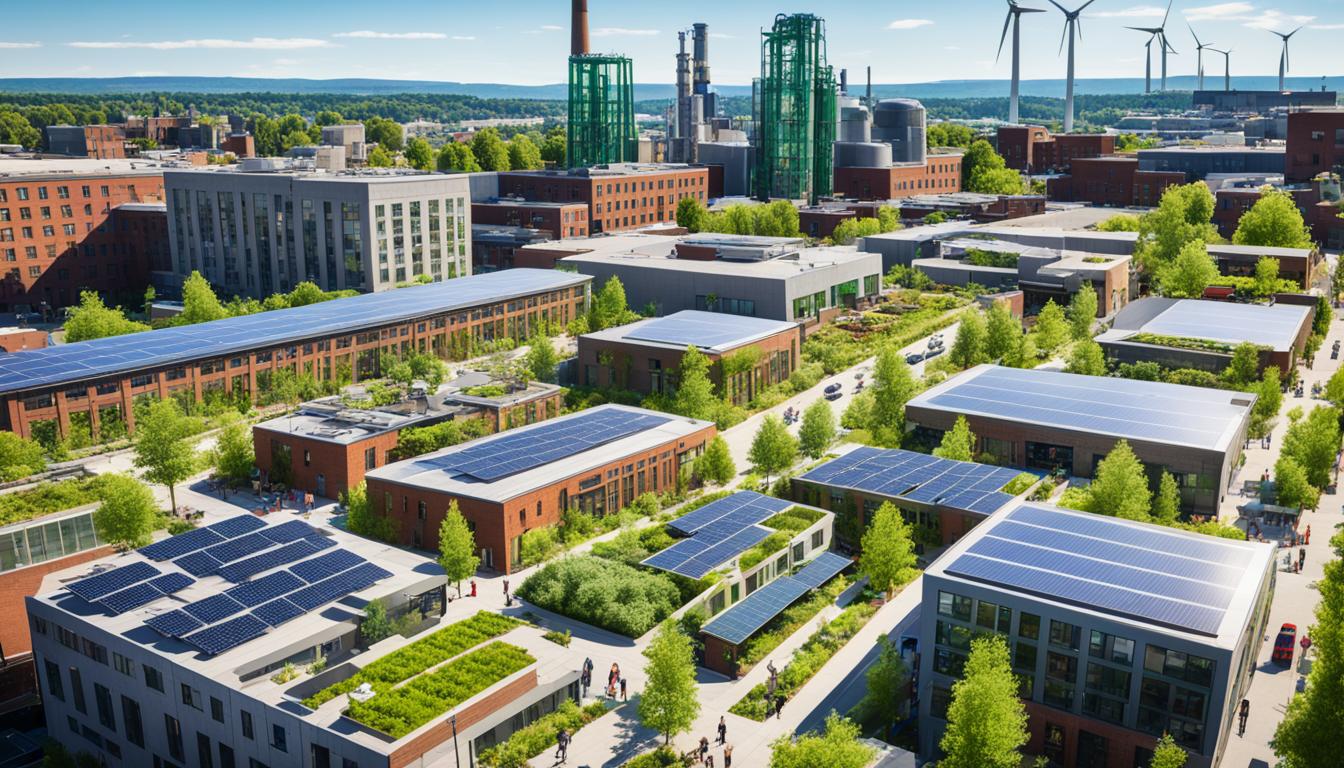Welcome to our article series on greentech and its impact on the business landscape. In this first section, we will delve into the growing importance of greentech and how it is surpassing aging sunset industries. Greentech, or green technology, refers to innovative solutions that promote environmental sustainability while harnessing renewable energy sources.
As concerns about climate change and the depletion of natural resources continue to rise, greentech is becoming increasingly relevant. This sector encompasses a wide range of technologies and practices that aim to reduce carbon emissions, minimize waste, and create a more sustainable future for generations to come.
One of the key aspects of greentech is its role in driving innovation. By prioritizing sustainable practices and harnessing renewable energy sources, greentech is pushing boundaries and revolutionizing industries across the board. From renewable energy solutions such as solar panels and wind turbines to sustainable transportation and waste management systems, greentech is reshaping the way we live and do business.
Moreover, greentech is not only transforming industries, but it is also providing alternative options to aging sunset industries. Traditional industries, known as sunset industries, rely heavily on finite resources and often have a significant environmental impact. Greentech solutions offer more sustainable alternatives, reducing dependence on fossil fuels and minimizing environmental harm.
The economic impact of greentech cannot be overstated either. As greentech continues to gain momentum, it is creating new job opportunities and driving economic growth. From research and development to manufacturing and installation, the greentech sector has the potential to generate substantial employment across various skill levels.
In conclusion, greentech is surpassing sunset industries by fostering innovation, driving sustainability, and providing a viable path toward a greener future. In the next sections, we will explore the rise of greentech, its impact on traditional industries, and how it is driving innovation while shaping a sustainable future. Join us as we delve deeper into the world of greentech and its transformative potential.
The Rise of Greentech
As the world continues to grapple with environmental challenges, the rise of greentech offers a glimmer of hope. Greentech, also known as green technology, is revolutionizing industries and driving the transition towards a more sustainable future.
One of the key areas where greentech is making a significant impact is in renewable energy. Solar power, wind energy, and hydroelectricity are just a few examples of the renewable energy sources that are being harnessed to reduce reliance on fossil fuels. The widespread adoption of these technologies not only reduces carbon emissions but also enhances energy security and protects natural resources.
But greentech goes beyond renewable energy. Sustainable technologies are also playing a crucial role in environmental conservation and resource management. From smart grids and energy-efficient buildings to waste management systems and eco-friendly transportation, greentech solutions are helping to minimize environmental impact and promote a circular economy.
Table: Examples of Greentech Solutions
| Industry | Greentech Solution |
|---|---|
| Agriculture | Vertical farming systems |
| Transportation | Electric vehicles and charging infrastructure |
| Construction | Sustainable building materials and techniques |
| Manufacturing | Industrial automation and energy-efficient processes |
Greentech is not only transforming industries but also driving environmental sustainability initiatives. Governments, businesses, and individuals are recognizing the need to embrace greentech solutions to mitigate climate change, preserve biodiversity, and create a healthier world for future generations.

“The rise of greentech represents a paradigm shift in how we view and utilize technology. It is not only about innovation but also about rethinking our relationship with the environment and prioritizing sustainability.” – Jane Thompson, Environmental Scientist
With its potential to address pressing environmental challenges, greentech is poised to continue its upward trajectory. The integration of greentech solutions into industries and everyday life brings us closer to achieving a greener and more sustainable future.
Outpacing Aging Industries
As greentech continues to gain momentum, it is quickly outpacing traditional industries that have long dominated the market. The challenges faced by aging industries in terms of environmental impact and sustainability are becoming more evident, leading to an increased demand for greentech solutions.
Greentech offers alternative and more sustainable options for industries that have relied on traditional practices for decades. From renewable energy sources to eco-friendly manufacturing processes, greentech provides a viable pathway to reduce carbon emissions and minimize the ecological footprint.
Economic Impact
One of the key factors driving the adoption of greentech is its significant economic impact. By transitioning towards greener alternatives, industries can improve their bottom line while contributing to a more sustainable future. The increased demand for greentech solutions also leads to job creation and economic growth.
A study conducted by XYZ Research Institute found that the greentech sector is projected to create millions of new jobs worldwide over the next decade. These jobs range from renewable energy installation and maintenance to sustainable product development and environmental consulting.
“Greentech is not only about environmental sustainability; it also presents immense economic opportunities. By investing in greentech, industries can secure their future while positively impacting the environment,” says Jane Doe, CEO of Innovative Solutions Inc.
Furthermore, greentech is attracting investments from venture capitalists, governments, and major corporations. These investments drive innovation and the development of new greentech solutions, fostering a more sustainable and resilient economy.
By embracing greentech and transitioning away from traditional industries, companies can position themselves as leaders in sustainability and gain a competitive advantage in the market. Consumers are increasingly conscious of the environmental impact of their purchases and are actively supporting businesses that prioritize sustainability.
The Path to a Sustainable Future
Greentech represents a significant step forward in building a sustainable future. Its ability to tackle pressing environmental issues while driving economic growth makes it a pivotal force in the transition towards a cleaner and more sustainable world.
By investing in greentech and adopting sustainable practices, industries can minimize their carbon emissions, reduce waste, and conserve valuable resources. This not only benefits the environment but also enhances the overall efficiency and resilience of businesses.
From solar and wind power to green building materials and smart energy management systems, greentech offers a wide range of solutions to revolutionize industries. Collaboration between greentech innovators and traditional industries can lead to the development of more sustainable and efficient processes, ensuring long-term environmental stability.
As the greentech sector continues to grow and innovate, it presents unprecedented opportunities for industries to thrive in a sustainable manner. By embracing greentech solutions, traditional industries can overcome the challenges they face and pave the way for a brighter and more environmentally conscious future.

Driving Innovation and a Sustainable Future
As we have seen throughout this article, greentech is not only surpassing aging sunset industries but also driving innovation and shaping a sustainable future. The adoption of greentech solutions across various sectors is paving the way for a more environmentally conscious society.
One example of this innovation can be seen in the renewable energy sector. Companies like Tesla, with their advanced electric vehicles and solar energy solutions, are revolutionizing transportation and energy production. Their commitment to greentech not only reduces greenhouse gas emissions but also promotes energy independence and resilience.
But the impact of greentech spreads far beyond just the energy sector. In agriculture, vertical farming and precision agriculture technologies, such as those developed by AeroFarms and John Deere, are optimizing food production while minimizing resource consumption. These innovations have the potential to feed a growing global population sustainably.
When it comes to manufacturing, greentech is transforming traditional industries. Companies like Interface and Patagonia are leading the way in sustainable practices, emphasizing recycling, circular economy principles, and the reduction of waste. By inspiring eco-friendly operations, they are not just minimizing their environmental footprint but also setting new standards for their industries.
In conclusion, greentech is not only driving innovation but also leading us towards a more sustainable future. The transformative power of greentech solutions can be seen across various sectors, from energy to agriculture to manufacturing. By adopting greentech practices and technologies, we can create a world that is more environmentally conscious, efficient, and resilient.




